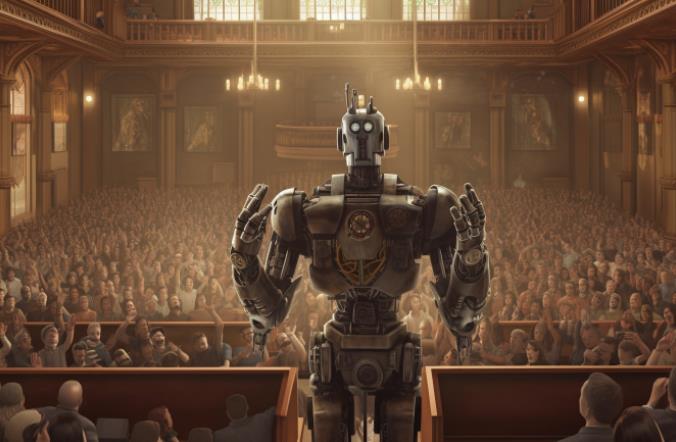Professor Jeffrey Hinton, a pioneer in the field of artificial intelligence, recently issued a stern warning that artificial intelligence may lead to human extinction within the next decade. The "godfather of artificial intelligence" deeply regrets his involvement in creating this technology. He compared the rapid development of artificial intelligence to the industrial revolution, but pointed out that this "revolution" may be dominated by machines and eventually humans lose control. He called on governments to strengthen supervision of artificial intelligence companies to deal with potential huge risks, and expressed concerns about the future development direction of artificial intelligence.
Professor Jeffrey Hinton, the "godfather of artificial intelligence", has warned that artificial intelligence may lead to human extinction within the next decade. The computer scientist, who admitted regretting his role in creating the technology, likened the rapid development of artificial intelligence to the industrial revolution but warned that this time machines could "take over everything".
The 77-year-old British computer scientist, who won the Nobel Prize in Physics for his pioneering work in the field of AI, called on governments to strengthen supervision of artificial intelligence companies. Professor Hinton has previously predicted that there is a 10% chance that artificial intelligence will lead to the demise of mankind within 30 years.
Asked during an interview on BBC Radio 4's Today program if anything had changed his analysis, he said: "Not actually. I think it's 10 to 20 years, maybe even less. We've never done that before. Dealing with something more intelligent than yourself. How many examples do you know of something more intelligent being controlled by something less intelligent? There are very few.”

In the 1980s, Professor Hinton invented a method that can autonomously find attributes of data and identify specific elements in pictures, which laid the foundation for modern artificial intelligence. He said the technology was developing "much faster than he expected" and could reduce humans to the equivalent of "three-year-olds" and AI become "adults".
He continued: "I think it's like the Industrial Revolution. In the Industrial Revolution, human power [became less important] because machines were more powerful - if you wanted to dig a trench, you would dig it with a machine." We now Possessions are replacing human intelligence. The intelligence of ordinary humans will no longer be at the forefront, and machines will replace humans. "
Professor Hinton predicts that artificial intelligence will bring about earth-shaking changes to ordinary people's lives, just like the industrial revolution, as recorded by Charles Dickens. What life will look like in the future with this technology will "largely depend on how our political system uses this technology," he said.
He added: "My concern is that even if it leads to huge increases in productivity, which should be good for society, if all the benefits go to the rich and a lot of people lose their jobs and become poorer, that could end up It would be very detrimental to society.”
"These things are smarter than us. So in the industrial revolution, machines could never replace humans just because they were more powerful. We still control everything because we have intelligence. Now, it's possible for these things to control everything, so it's A big difference.”
He said he "hopes" other "very knowledgeable" experts in the field are right to be optimistic about the technology's future.
However, Professor Hinton added: "I fear the invisible hand will not keep us safe. So simply leaving it to the profit motive of big companies is not enough to ensure they develop it safely."
"The only thing that can force those big companies to do more security research is government regulation." "So I firmly believe that the government needs to force the big companies to do a lot of security research."
Professor Hinton has previously said he has some regrets about introducing the technology to the world. He said: "There are two kinds of regret. One is the guilt you feel for doing something you know you shouldn't have done, and the other is regret where you would do it again in the same situation, but it might not turn out well in the end. "
"I have a second regret. I would do it again in the same situation, but I'm worried that the overall consequence of this is that systems smarter than us will eventually control everything. We haven't experienced anything smarter than us what things are like.”
Professor Hinton’s warning has sounded the alarm for the future development of artificial intelligence, emphasizing the importance of strengthening supervision and ethical considerations. It has also triggered people’s profound thinking about the potential risks of artificial intelligence. Global joint efforts are needed to ensure that artificial intelligence technology continues to move forward. development that is conducive to humankind.